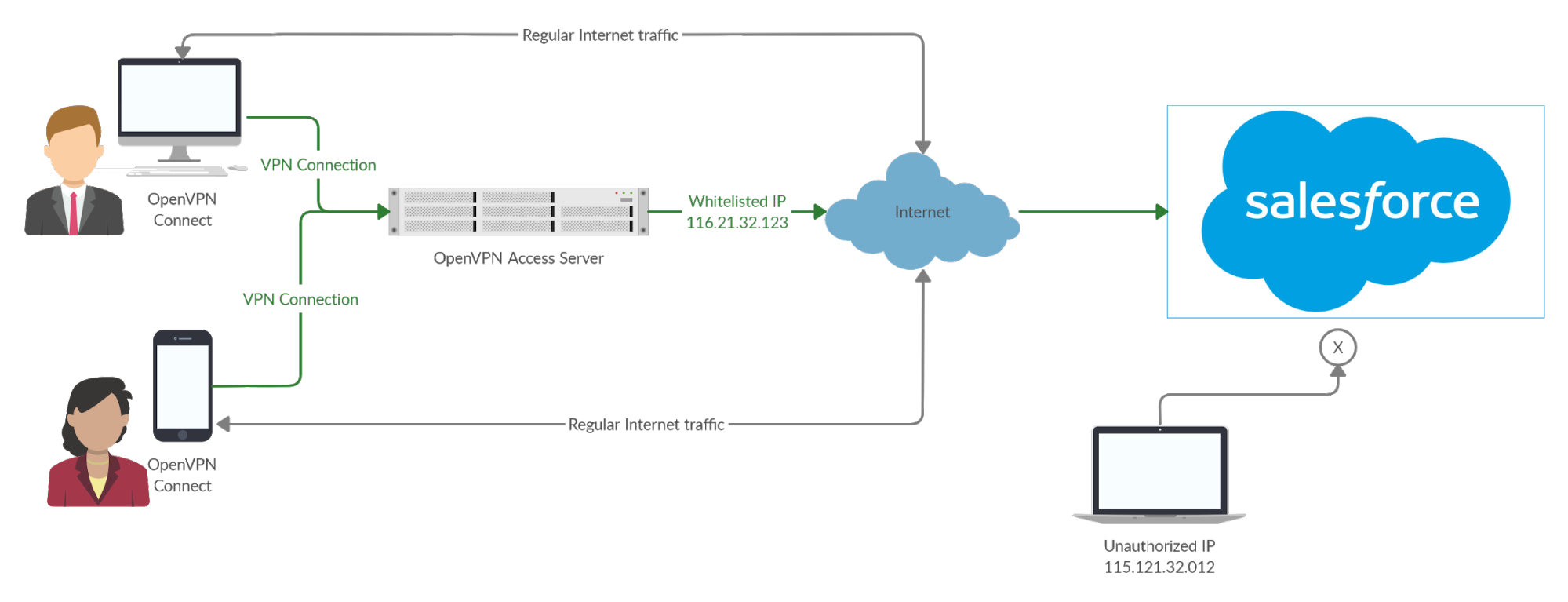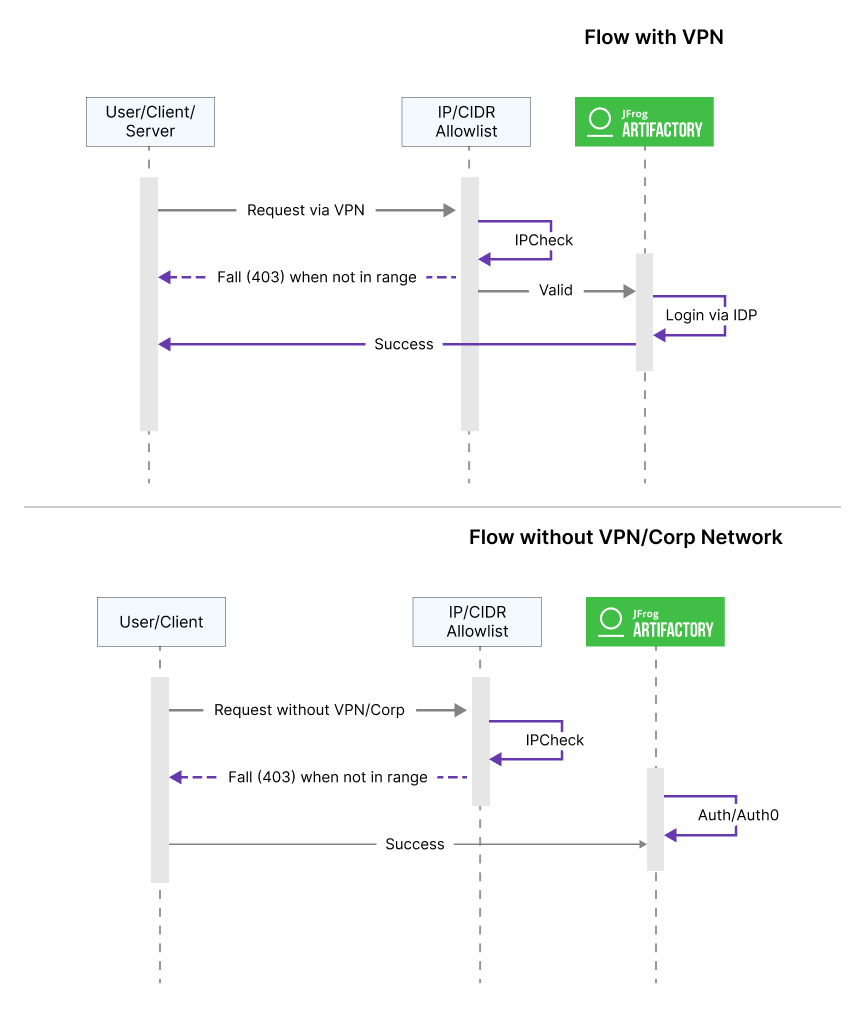In today’s digital age, securing online access is crucial. Two popular methods are IP allowlisting and VPN.
Understanding these options can help you choose the best way to protect your data. IP allowlisting and VPNs both aim to secure online access, but they do so differently. IP allowlisting restricts access to specific IP addresses, ensuring only authorized users can connect.
VPNs, on the other hand, create secure, encrypted connections over the internet. Comparing these methods can be helpful for those seeking the best security solution for their needs. This guide will explore the differences, benefits, and potential drawbacks of both IP allowlisting and VPNs, helping you make an informed decision.

Credit: openvpn.net
Overviews of Contents
ToggleWhat Is Ip Allowlisting?
IP Allowlisting is a security measure used to control access to a network. By specifying which IP addresses can access certain resources, it ensures that only trusted devices gain entry. This method is effective for enhancing network security and managing user access.
Definition And Mechanism
IP Allowlisting involves creating a list of approved IP addresses. These addresses are then allowed to access specific systems or networks. This process helps in ensuring that only users from trusted locations can connect.
The mechanism is straightforward. When a user attempts to connect, the system checks their IP address against the allowlist. If the address is on the list, access is granted. If not, the connection is denied. This simple yet effective method adds a layer of security by controlling who can access your network.
Looking for more insights on VPN? You may find this post valuable. The Best Free VPNs for Torrenting: Secure and Fast Options
Common Use Cases
IP Allowlisting is used in various scenarios:
- Corporate Networks: Ensures only employees’ devices can access internal systems.
- Remote Work: Allows employees to connect securely from designated locations.
- Web Applications: Restricts access to admin dashboards or sensitive data to known IP addresses.
These use cases highlight how IP Allowlisting can protect sensitive information and maintain network integrity.

Credit: jfrog.com
What Is A Vpn?
Understanding the concept of a VPN is crucial in the debate between IP allowlisting and VPNs. A VPN, or Virtual Private Network, is a technology that creates a secure connection over the internet. This secure connection is often used to protect sensitive data and ensure online privacy.
Definition And Functionality
A VPN works by establishing a virtual point-to-point connection through dedicated circuits or with tunneling protocols. This connection encrypts the data passing through, making it unreadable to unauthorized users.
It does this by routing your device’s internet connection through a private server. This server hides your IP address, making it appear as if the data is coming from the VPN server instead of your device.
VPNs help maintain privacy and security, preventing hackers and snoopers from tracking your online activities.
Common Applications
VPNs are widely used in various scenarios:
- Remote Work: Employees use VPNs to access company networks securely.
- Public Wi-Fi Security: VPNs protect data from hackers on public networks.
- Geographical Restrictions: Users access content that is blocked in their region.
- Privacy Protection: VPNs hide browsing activities from ISPs and advertisers.
Each of these applications highlights the versatility and importance of VPNs in maintaining online privacy and security.
Discover more interesting content on VPN by reading this post. Best Vpn for Japan: Unlock Fast, Secure, and Private Browsing
Benefits Of Ip Allowlisting
IP allowlisting is a method to restrict network access to specific IP addresses. This security measure offers several advantages over traditional VPNs. In this section, we explore the benefits of IP allowlisting.
Enhanced Access Control
IP allowlisting grants access only to authorized IP addresses. This ensures that only trusted users can connect to your network. Enhanced access control helps in minimizing the risk of unauthorized access. It also provides better oversight over who can access sensitive data.
Reduced Attack Surface
By limiting access to specific IP addresses, the attack surface is significantly reduced. This means fewer entry points for potential attackers. Reduced attack surface makes it harder for malicious entities to exploit vulnerabilities. It strengthens the overall security posture of your network.
Benefits Of Vpn
Virtual Private Networks (VPNs) offer numerous benefits for both individuals and businesses. They enhance security, provide privacy, and allow access to restricted content. Discovering the advantages of using a VPN can help you understand why it is an essential tool for online activities.
Data Encryption
A VPN encrypts your data. This means your online activities are protected from prying eyes. Encryption ensures that sensitive information, such as passwords and credit card numbers, remains secure. It prevents hackers and cybercriminals from intercepting your data.
Data encryption is crucial for anyone who uses public Wi-Fi networks. Public Wi-Fi is often unsecured, making it easy for hackers to steal your information. With a VPN, your data is encrypted, even on public networks. This provides peace of mind and security.
Want to learn more about VPN? This post could provide more insights. Private Internet Access Vs Surfshark: Ultimate VPN Comparison
Anonymity And Privacy
Using a VPN enhances your anonymity online. It hides your IP address, making it difficult for websites and advertisers to track you. This helps protect your personal information and browsing habits from being monitored.
A VPN also provides privacy by masking your location. This is especially useful for accessing content that is restricted in your region. By connecting to a server in another country, you can browse the internet as if you were in that location. This allows you to access a wider range of content.
| Benefit | Description |
|---|---|
| Data Encryption | Protects your information from hackers and cybercriminals |
| Anonymity | Hides your IP address and makes tracking difficult |
| Privacy | Masks your location and allows access to restricted content |
VPNs are essential for maintaining security and privacy online. They provide robust data encryption and enhance anonymity. By using a VPN, you can browse the internet safely and access content from around the world.
Limitations Of Ip Allowlisting
IP Allowlisting is a common security measure that restricts access to only approved IP addresses. Despite its benefits, IP Allowlisting has several limitations. These limitations can impact the efficiency and scalability of your network. Let’s explore some of these challenges.
Scalability Issues
IP Allowlisting can struggle with scalability. For growing businesses, the number of IP addresses can increase rapidly. Each new IP address must be manually added to the allowlist. This process can become time-consuming and error-prone. Large-scale networks may find IP Allowlisting impractical.
Interested in more about VPN? Here's an article you might find helpful. Nordvpn Vs Expressvpn: Which VPN Reigns Supreme in 2025?
Maintenance Overhead
Maintaining an IP allowlist requires constant updates. Whenever an employee’s IP address changes, the allowlist must be updated. This could be due to dynamic IP addresses or remote work scenarios. Frequent updates can lead to high maintenance costs and administrative burden.
Furthermore, the risk of human error increases with manual updates. Mistakes in the allowlist could block legitimate users or allow unauthorized access. This can compromise network security and efficiency.

Credit: confluence.atlassian.com
Limitations Of Vpn
Virtual Private Networks (VPNs) are popular for securing online activities. Yet, they come with several limitations. These drawbacks can affect performance and security. Understanding these limitations is crucial for making informed decisions.
Performance Impact
One major drawback of VPNs is their impact on performance. VPNs encrypt data, which takes time and resources. This process can slow down your internet connection.
Latency is another issue. The distance between the user and the VPN server can increase latency. This can cause delays in data transmission.
Bandwidth limitations also play a role. Many VPNs have limited bandwidth. This can affect activities like streaming and downloading large files.
Potential For Misuse
VPNs can also be misused. Unauthorized users might gain access to sensitive data. This can happen if VPN credentials are compromised.
Bypassing restrictions is a common misuse. Users can access restricted content, which might be illegal. This misuse can lead to legal consequences.
Unsecured VPNs pose a risk too. Some VPNs do not offer strong encryption. This can expose users to cyber threats.
In short, VPNs have limitations. They can impact performance and be misused. Understanding these issues helps in making better choices.
Choosing The Right Solution
Deciding between IP allowlisting and VPN can be challenging. Both have their strengths and weaknesses. Understanding your organization’s unique needs is key to making the right choice.
Security Needs Analysis
Start by assessing your security needs. IP allowlisting restricts access to specific IP addresses. This method is effective for controlling access to internal resources. It works best for static IP addresses.
On the other hand, VPN provides encrypted connections. It secures data over public networks. VPNs are ideal for remote workers needing secure access to company resources.
| Security Feature | IP Allowlisting | VPN |
|---|---|---|
| Access Control | Static IPs only | Remote and local users |
| Data Encryption | No | Yes |
| Setup Complexity | Low | Moderate |
Integration With Existing Systems
Consider how each solution integrates with your current systems. IP allowlisting is simple to implement. It’s compatible with many existing network setups. This method doesn’t require additional software.
VPN may require more integration effort. Ensure your infrastructure supports VPN connections. Check for compatibility with your current firewall and network policies.
- Review your current security setup.
- Identify any potential integration challenges.
- Determine the level of technical expertise required.
Choosing between IP allowlisting and VPN depends on your specific needs. Evaluate your security requirements and integration capabilities. This will help you make an informed decision.
Frequently Asked Questions
What Is Ip Allowlisting?
IP Allowlisting is a security measure. It restricts access to certain IP addresses.
How Does A Vpn Work?
A VPN creates a secure, encrypted connection. It hides your IP address.
Which Is More Secure, Ip Allowlisting Or Vpn?
Both have pros and cons. IP Allowlisting is good for specific access. VPN provides broader protection.
Can I Use Both Ip Allowlisting And Vpn?
Yes, using both increases security. IP Allowlisting for specific access. VPN for overall privacy.
Conclusion
Choosing between IP allowlisting and VPN depends on your specific needs. IP allowlisting offers tighter access control. VPN provides secure remote access. Both methods enhance security but in different ways. Consider your organization’s size and requirements. Evaluate the risks and benefits of each.
Remember, no method is foolproof. Regularly update your security measures. Stay informed about new threats. Make informed decisions for optimal protection. Security is an ongoing process.




